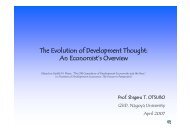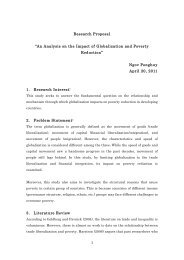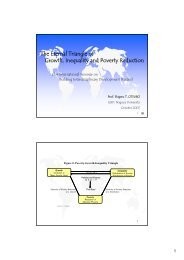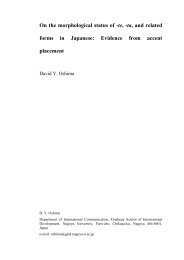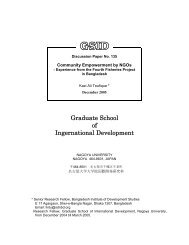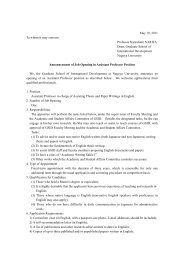Report
Report
Report
You also want an ePaper? Increase the reach of your titles
YUMPU automatically turns print PDFs into web optimized ePapers that Google loves.
T RADE IN SERVICES AND SOUTH ASIA: AN OVERVIEW 101<br />
of improving the quality of education. It could be<br />
suggested that the Maldives ought to undertake<br />
commitments in construction, education and tourism<br />
services. Although population wise the Maldives is the<br />
smallest country in South Asia, its market may not be<br />
ignored in view of the highest per capita income it has<br />
in the region and the country is an import-dependent<br />
one. There is already services trade taking place between<br />
the Maldives and other South Asian countries,<br />
particularly with India, Bangladesh and Sri Lanka. For<br />
export of labour from these countries the Maldives<br />
provides an attractive market. Indian hotel companies<br />
have several hotels and resorts in Maldives.<br />
Bhutan<br />
Bhutan is currently negotiating accession to the WTO.<br />
It became an observer in 1999 and has now entered<br />
the advanced stage of accession negotiations. It expects<br />
to become a full-fledged member of the WTO in 2008.<br />
By all measures Bhutan is a small country and its economy<br />
overwhelmingly relies on India. From the studies<br />
Bhutan has assigned to various research organisations<br />
it appears that financial services, telecommunications,<br />
energy, and tourism services are considered important<br />
(Rinchen 2004).<br />
Like many small economies, Bhutan is a highly open<br />
and trade-dependent economy, with trade comprising<br />
65% of its GDP (UNESCAP 2003). Bhutan has also<br />
opened the economy to foreign investments. Under the<br />
present circumstances, it is not mandatory for a business<br />
firm to comply with FDI requirements (Tobgay 2007).<br />
However, in the sectors opened under WTO, all foreign<br />
players would be required to enter through the FDI<br />
channel and contribute to the nation as a national legal<br />
entity.<br />
Although there are several structural limitations<br />
and external sector vulnerabilities, the government has<br />
followed prudent policies to ensure a sound macroeconomic<br />
environment. Bhutan pursues a conservative<br />
fiscal policy (UNESCAP 2003). Domestic revenues have<br />
to cover recurrent expenditures, and capital expenditure<br />
is largely determined by the availability of external<br />
assistance. Various efforts are underway to increase<br />
exports that can earn convertible currency given the<br />
limited diversification of trade. For example, the<br />
government has waived corporate income tax on<br />
income earned in convertible currency for manufacturing<br />
units, information technology industries or<br />
services and agriculture produce.<br />
In December 2002, the government approved the<br />
Foreign Direct Investment Policy (FDIP) with a view<br />
to fostering private sector development, generating<br />
employment, enabling the transfer of capital,<br />
technology and skills, and enhancing convertible<br />
currency earnings (Ibid: 197). In the case of Bhutan,<br />
FDI is understood to be investments made in convertible<br />
currencies only. Prior to this policy, limited foreign<br />
investment was allowed in the banking, tourism and<br />
industrial sectors on a case-by-case basis.<br />
The FDIP sets out the broad parameters for foreign<br />
investors by delineating areas and size of investments,<br />
skills transfer requirements for import of capital goods<br />
must be met out of foreign equity; (b) repatriation of<br />
profits and dividends must be balanced by net foreign<br />
exchange earnings; and (c) repayment of foreign<br />
currency loans will be permitted subject to prior<br />
approval of the loans by the Government. With a<br />
minimum requirement of $0.5 million, the services<br />
sectors open for FDI include: tourism including hotels,<br />
roads and bridges, housing, and education services.<br />
However, foreign investors can hold up to 70% equity<br />
(UNESCAP 2003:197).<br />
ESCAP argues that while the adoption of FDI policy<br />
is significant, it is still deemed conservative (UNESCAP<br />
2003). Bhutan’s main services sectors comprise<br />
construction, transport, telecommunications, tourism<br />
and hotels, and the retail trade. The high growth rates<br />
in the transport and construction sectors are related to<br />
the construction of large hydropower plants in the<br />
country. Publicly funded infrastructure works including<br />
the construction and repair of roads and housing<br />
complexes dominate the construction sector.<br />
Tourism is perhaps the only services sector that may<br />
be of interest to foreign firms in the near future. The<br />
entry of foreign suppliers could have a positive catalytic<br />
impact on the private sector in Bhutan. For example,<br />
foreign banks will be able to provide Bhutanese entrepreneurs<br />
with better services and more sophisticated<br />
financial products. However, it is unlikely that foreign<br />
suppliers will rush to Bhutan’s small services market,<br />
given the limited demand for services and the high cost<br />
of delivery of services (UNESCAP 2003).<br />
Due to the shortage of skilled domestic labour, over<br />
50,000 Indian nationals are employed in Bhutan in the<br />
construction sector. The government, on the other hand,<br />
has adopted strict limits on the number of immigrant<br />
labourers allowed as a result of political obligation.<br />
However, the lack of consistency in government policies<br />
related to labour, taxation and licensing is also perceived<br />
as a constraint by the private sector (UNESCAP<br />
2003).




